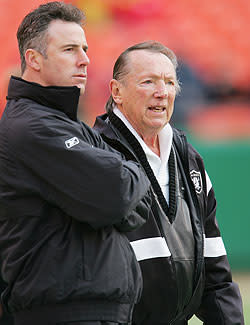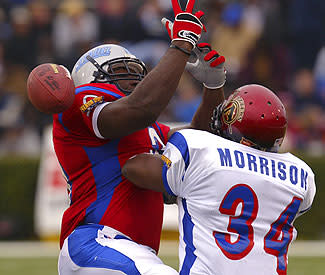Kiffin saga just part of five-year abyss
The height of Rich Gannon's NFL career was with the Oakland Raiders. As league MVP, he led the team to Super Bowl XXXVII during the 2002 season. He played alongside stars Jerry Rice and Tim Brown for one of the most storied franchises in sports history.
Yet, for all the glory Gannon enjoyed, he can tell everyone what a struggle it was to play for the organization.
"It's like I've said many times, every day was a fight inside that building to do what we did," said Gannon, now a TV commentator. "We had to overcome adversity in the building and then get on a plane to go try to beat Denver.
"When I played in Kansas City, all I had to do was walk in the door. I didn't have to worry about guys showing up late for practice or meetings, guys being out drinking until 3 a.m. or missing curfew the night before games. In Kansas City, that stuff didn't happen. In Oakland, it was an everyday occurrence."

Gannon, with Davis, in 2004 – his last season with the Raiders.
(Getty/Jamie Squire)
Considering that, it should be no surprise that in the five years since Gannon and Oakland were at the top of their game, the franchise has fallen into a deep abyss. Since the end of 2002, which culminated in a lopsided loss to Tampa Bay in the Super Bowl, the Raiders have lost at an unprecedented rate.
The net result is that the Raiders have suffered five consecutive seasons with at least 11 losses, going 20-62 in the past five-plus seasons in a league that is designed around the principal of parity.
Part of the problem has been that on-the-field leaders such as Gannon, Rice, Brown, Trace Armstrong, John Parrella, Lincoln Kennedy and Bill Romanowski have been replaced by … well, they haven't been replaced.
"What you have left is all these guys (owner) Al (Davis) loves; these disaffected, talented guys who are only marginally productive and weren't really even all that productive in college," one unnamed former Raiders employee said. "They don't care about winning, but (those are) the guys who are supposedly the leaders."
While the team has lacked consistent production from players on the field, the franchise has been the epitome of instability on the sidelines. Current head coach Lane Kiffin is the fourth since Gruden was essentially traded to Tampa Bay after the 2001 season.
Barring an out-of-body experience by Davis, there will be a fifth coach very soon. It's not that Kiffin is simply on the outs after refusing to step aside in January when Davis reportedly drew up a resignation letter for him. Kiffin, repeatedly taking verbal shots at the owner in the media, wants out faster than investors can dump their AIG stock.
"That's the funny part about people asking if he's worried about getting fired," said a source close to Kiffin. "He's worried that he might be stuck there the whole season."
So sometime in the next few days or weeks, Kiffin will be fired. While such a move addresses the short-term issue of an owner getting rid of a coach he doesn't want, it doesn't solve the bigger problem: The Raiders are an institutional mess.
"They say there are 32 organizations in the NFL, but really it's only 31," one former Raiders player said. "The Raiders aren't an organized team."
Or as former Cowboys and Dolphins coach Jimmy Johnson, now a FOX analyst, said last weekend: "I don't know that there's a lot of people who would want to work there. It's a mess and it's been a mess for quite some time, I just don't know how anybody functions in that type of atmosphere. They do have some good young players and they showed that (against the Broncos). I think eventually this team will be one to be dealt with but as far as being a coach there, being an assistant coach, being someone in administration, it really is a mess."
If there is a center to the dysfunction, it's Davis. The former coach-turned-executive is a Hall of Famer and has long been considered a brilliant football strategist and football businessman. The problem is that at a time when the NFL has become increasingly sophisticated, Davis is too old school and hands on.
"You want to know how far behind the times he is? He still signs everybody's expense forms," another unnamed former employee said. "Not a dollar gets spent in that place that he doesn't have a say about."
While that may have been a functional way to do business in the NFL 20 years ago, it's unfathomable at a time when a majority of the NFL's teams are worth more than a $1 billion.
Davis' control goes well beyond monitoring if someone has gone over per diem. Davis makes nearly all the personnel decisions and has systematically eliminated people who used to disagree with him.
"If he had his way, we'd have taken Jordan Beck instead of Kirk Morrison, but we wouldn't let him," former Raiders personnel man Mike Lombardi said, recalling a draft-day debate he had with Davis in 2005 over which linebacker to select in the third round. "He wanted Beck, but we had coached Morrison at the Senior Bowl and the whole coaching staff believed that Morrison was the best player we had seen there. We all told him, no, Morrison is the guy."

Morrison makes a play during the Senior Bowl.
(AP/G.M. Andrews)
Beck was waived by Atlanta after 2006, played part of 2007 with Denver and is now out of football after being waived by the Broncos in August.
Morrison has been a starter since he was a rookie.
While second-guessing Davis on one draft pick is being picky to say the least, what has happened since is indicative of Davis' desire to control and his lack of understanding what works in the modern NFL.
"Everything is about, 'Remember when …' " said Lombardi, making an open-ended remark about how Davis is trying to conjure past greatness.
For instance, before the 2007 draft, Davis told ESPN's Chris Mortensen that quarterback JaMarcus Russell reminded him of Jim Plunkett, another chunky-bodied quarterback who won two titles with the Raiders in the 1980s. Plunkett was a No. 1 overall, although long before Oakland picked him up as a reclamation project.
Likewise, Davis' fascination with defensive backs (the Raiders have used a first-round pick on either a cornerback or safety in five of the past eight years and this offseason signed safety Gibril Wilson as a free agent and traded for DeAngelo Hall) harkens to the days when the Raiders won titles with Mike Haynes, Lester Hayes, Jack Tatum and George Atkinson.
Perhaps even more significant, Davis allows players great latitude. Former Raiders lineman Adam Treu recently wrote a column on nationalfootballpost.com about the blatant uniform violation by the Oakland defensive backs in the season opener. Treu derided it as an affront to league rules and sign that the players had no respect for authority.
That should be no surprise. Davis has often reportedly overruled coaches when they have tried to fine players or told coaches who needs to play. On the way to the Super Bowl in the 2002 season, the Raiders would regularly fly on a Friday before a Sunday game. According to multiple team sources, the reason was that a large number of players would get drunk on the plane ride to a road game.
"We needed Saturday to get sober so we could play on Sunday," one former player said.
How does the problem get fixed?
"The first step to rebuilding the team is to tell the owner not to walk in the door ever again. The next is to get rid of the front office and then all the personnel people … There's no structure in place. That's why nothing is going to change," said another former Raiders player.
